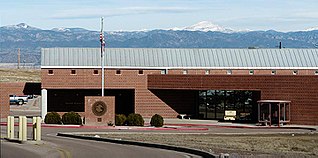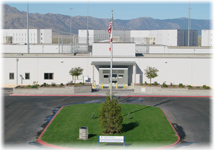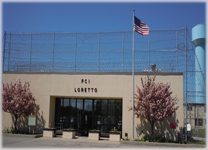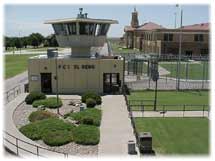
The Aryan Brotherhood is a neo-Nazi prison gang and an organized crime syndicate that is based in the United States and has an estimated 15,000–20,000 members both inside and outside prisons. The Southern Poverty Law Center (SPLC) has characterized it as "the nation's oldest major white supremacist prison gang and a national crime syndicate" while the Anti-Defamation League calls it the "oldest and most notorious racist prison gang in the United States". According to the Federal Bureau of Investigation (FBI), the Aryan Brotherhood makes up an extremely low percentage of the entire US prison population, but it is responsible for a disproportionately large number of prison murders.

The Federal Correctional Institution, Seagoville is a low-security United States federal prison for male inmates in Seagoville, Texas in the Dallas-Fort Worth metropolitan area. It is operated by the Federal Bureau of Prisons, a division of the United States Department of Justice. The facility includes a detention center for male offenders and an adjacent satellite prison camp that houses minimum security-male offenders.

The Federal Medical Center, Carswell is a United States federal prison in Fort Worth, Texas, for female inmates of all security levels, primarily with special medical and mental health needs. It is operated by the Federal Bureau of Prisons (BOP), a division of the United States Department of Justice. The facility also has a prison camp for minimum-security female inmates.

The Federal Correctional Institution, Dublin was a low-security United States federal prison for female inmates in Dublin, California. The facility also has an adjacent satellite prison camp housing minimum-security female offenders.

The Metropolitan Correctional Center, Chicago is a United States federal prison in Chicago, Illinois, which holds male and female prisoners of all security levels prior to and during court proceedings in the Northern District of Illinois, as well as inmates serving brief sentences. It is operated by the Federal Bureau of Prisons, a division of the United States Department of Justice.

The United States Penitentiary, Atwater is a high-security United States federal prison for male inmates in unincorporated Merced County, California. The institution also includes a minimum-security satellite camp. It is operated by the Federal Bureau of Prisons, a division of the United States Department of Justice.

The United States Penitentiary, Coleman I and II are high-security United States federal prisons for male inmates in Florida. It is part of the Coleman Federal Correctional Complex and is operated by the Federal Bureau of Prisons, a division of the United States Department of Justice. USP Coleman I was opened in 2001, and in 2004 Clark Construction completed a 555,000-square-foot (51,600 m2) additional component for USP Coleman II.

The United States Penitentiary, Florence High is a high-security United States federal prison for male inmates in Colorado. It is operated by the Federal Bureau of Prisons, a division of the United States Department of Justice. USP Florence High is part of the Federal Correctional Complex, Florence, which is situated on 49 acres (20 ha) of land and houses different facilities with varying degrees of security. It is named "Florence High" in order to differentiate it from the United States Penitentiary, Florence ADMAX, the federal supermax prison located in the same complex.

The Federal Correctional Institution, Waseca is a low-security United States federal prison for female offenders in Minnesota. It is operated by the Federal Bureau of Prisons, a division of the United States Department of Justice. The site, located 75 miles (121 km) from Minneapolis, was converted into a prison in 1992 after formerly serving as a University of Minnesota campus.

The Federal Correctional Institution, Herlong is a medium-security United States federal prison for male inmates in California, opened in 2007. It is operated by the Federal Bureau of Prisons, a division of the United States Department of Justice. The facility also includes a satellite prison camp that houses minimum-security male offenders.

The Federal Correctional Institution, Miami is a low-security United States federal prison for male inmates in Florida. It is operated by the Federal Bureau of Prisons (BOP), a division of the United States Department of Justice. The institution also has an adjacent satellite prison camp that houses minimum-security male offenders.

The Federal Correctional Institution, Loretto is a low-security United States federal prison for male inmates in Pennsylvania. An adjacent satellite prison camp houses minimum-security male offenders. It is operated by the Federal Bureau of Prisons, a division of the United States Department of Justice.

The United States Penitentiary, Beaumont is a high security United States federal prison for male inmates in unincorporated Jefferson County, Texas. It is part of the Federal Correctional Complex, Beaumont and is operated by the Federal Bureau of Prisons, a division of the United States Department of Justice.

Federal Correctional Institution, El Reno is a medium-security United States federal prison for male inmates in Oklahoma. It is operated by the Federal Bureau of Prisons (BOP), a division of the United States Department of Justice. The facility has an adjacent satellite camp for minimum-security male offenders.

The Federal Correctional Institution, Three Rivers is a medium-security United States federal prison for male inmates in unincorporated Live Oak County, Texas. It is operated by Federal Bureau of Prisons, a division of the United States Department of Justice. The facility also has an adjacent satellite prison camp which houses minimum-security male offenders.

The Federal Correctional Institution, Estill is a medium-security United States federal prison for male inmates in South Carolina. It is operated by the Federal Bureau of Prisons, a division of the United States Department of Justice. It also has an adjacent satellite camp for minimum-security male offenders.

The Federal Correctional Complex, Yazoo City is a United States federal prison complex for male offenders in unincorporated Yazoo County, Mississippi. It is operated by the Federal Bureau of Prisons, a division of the United States Department of Justice and is located 36 miles (58 km) north of Jackson, Mississippi. It consists of:
The Federal Correctional Complex, Petersburg is a United States federal prison complex for male inmates in Petersburg, Virginia. It is operated by the Federal Bureau of Prisons, a division of the United States Department of Justice.

The Federal Correctional Institution, Petersburg is a United States federal prison for low- and medium-security male inmates. It is part of the Petersburg Federal Correctional Complex (FCC) in Virginia and operated by the Federal Bureau of Prisons, a division of the United States Department of Justice. An adjacent satellite prison camp houses minimum-security male offenders. FCI Petersburg consists of two facilities:
Serafín Zambada Ortiz is an American convicted drug trafficker and high-ranking member of the Sinaloa Cartel, a criminal group based in Sinaloa. He is the son of Ismael "El Mayo" Zambada, top leader of the Sinaloa Cartel. He is married to Karime Ellameli Torres Acosta, the daughter of the late Manuel Torres Félix, another Sinaloa Cartel leader. Zambada Ortiz was active on social media, where he posted pictures of his extravagant lifestyle.






















